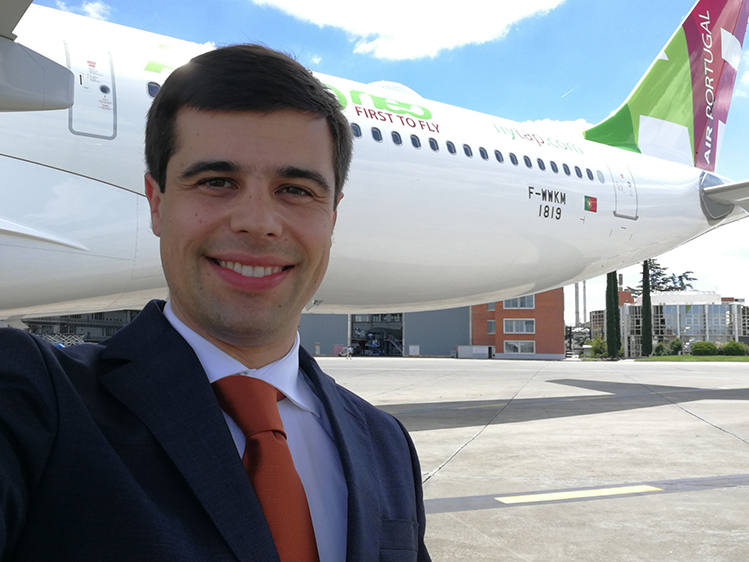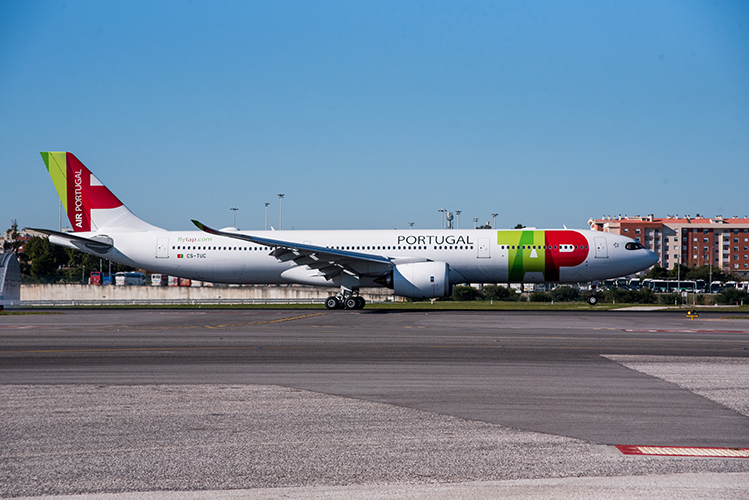Nick Preston talks to Nuno Leal, Head of Fleet Planning and Contracts, TAP Air Portugal, which became the first operator of the A330neo and will begin operations with the A321LR in 2019.
Portuguese flag carrier TAP Air Portugal has experienced a number of key developments in recent years, beginning with its privatisation in 2015. More recently, it has embarked on a fleet modernisation programme that saw it become the first operator of the A330-900neo. It is also adding A320neo family aircraft to renew its narrow-body fleet and will be an early adopter of the A321LR.

Nuno Leal, Head of Fleet Planning and Contracts, TAP Air Portugal: “TAP has a total order for 14 A321LRs, with the first 10 being delivered in 2019/2020. This aircraft will allow TAP to better leverage the unique position of its Lisbon hub and explore new routes or reinforce the airline’s position on existing services across the Atlantic to North and South America.”
“The airline carried 15.7 million passengers in 2018, representing more than 10% growth compared to 2017,” explains Nuno Leal, Head of Fleet Planning and Contracts, TAP Air Portugal. “TAP continues to reinforce its position as the number one airline from Europe to Brazil, and more and more passengers are benefiting from the ‘Portugal Stopover’ programme that has helped to open Portugal to the world. In 2018, TAP saw significant growth in the North American market and this trend is going to set the pace for 2019 as we plan to add San Francisco, Chicago, and Washington services from Lisbon, and a daily service from Porto to New York Newark. These new routes, plus the introduction of Tel Aviv and the natural growth in Europe, with new services to Dublin, Basel, Tenerife, Naples and reinforced operations in Porto, will allow TAP to grow passenger numbers by more than 10% in 2019.”
TAP’s current mainline fleet consists of 75 aircraft, including: 20 A320s, 21 A319s, four A321s, two A320neos, five A321neos, 12 A330-200s, four A330-300s, four A340-300s, and three A330-900neos. There are a further 17 aircraft operating under the TAP Express brand, including four ATR 72-600s and 13 E190/195s. “We expect to have a total of 17 A330-900neos flying before the end of 2019, completing a major widebody fleet renewal plan that comprises the phase-out of 13 older generation aircraft. This represents a key investment in more efficient aircraft and a much better product for the passenger,” says Leal.
By the end of 2019, TAP will be flying over 75% of its wide-body block hours in new generation aircraft. The total planned A330-900 fleet will reach 21 units.
“A silent revolution is also taking place in the narrow-body fleet,” Leal continues. “We expect to start operations with the A321LR later in March. TAP has a total order for 14 A321LRs, with the first 10 being delivered in 2019/2020. This aircraft will allow TAP to better leverage the unique position of its Lisbon hub and explore new routes or reinforce the airline’s position on existing services across the Atlantic to North and South America.”
The A319/A320ceo renewal process started in 2018 and is due to continue in 2019 and onwards. The A319s are being replaced by A320neo and A321neos, which burn less fuel and will also ‘upgauge’ the fleet. TAP has orders for 14 A321neos and 20 A320neos. Some of these will be used to replace older generation aircraft that will be retired, while others will be deployed to continue the impressive growth that the airline has seen during the last few years.
Next generation economics
“The new generation aircraft bring impressive economics that are already starting to be realised,” says Leal. “On the A330-900neo fleet, we are seeing a fuel burn reduction of 10%, while the aircraft are capable of carrying 10% more passengers than the majority of the previous generation types, without compromising passenger comfort and product levels. By the end of 2019, over 75% of the wide-body flown block hours will be in these new generation aircraft, and this represents major cost savings and a natural fuel hedging based on technology.”
On the narrow-body side, the A320neo and A321neo save 20% in fuel burn compared to the older aircraft. This means that the A321neo is burning less fuel than the older A319s, while carrying up to 72 additional passengers, resulting in a major reduction in fuel burn per seat. It is this level of improvement that TAP is targeting to better position itself as one of the most efficient airlines in the world.

Exploring new markets
“The new generation of aircraft will allow the operation of routes that were not economically viable before,” Leal explains. “Our A320ceo fleet currently operates numerous five-hour sectors on services to Africa and across Europe to Moscow. The increased range of our incoming neo variants will help the airline to explore longer distance sectors, and the improved economics will be a very important contributing factor to the profitability of such routes. Exploring these routes is essential for TAP’s hub and spoke strategy out of Lisbon and the connections to Europe.”
Portugal’s geographic position is a natural gateway from Europe to North America, South America and Africa. These new generation aircraft will help TAP explore this positioning even further.
“Compared to the previous generation, these more efficient aircraft have additional usable range and will enable new markets to be created, while improving economic efficiency on the current network,” Leal comments. “The A321LR has a range of around eight hours out of Lisbon and this will open a vast number of new growth opportunities in North America, South America, Africa and even the Middle East. Whether it’s opening new thin routes, operating existing routes with additional frequencies, or existing routes in close cooperation with the wide-body aircraft, the A321LR will play a key role in TAP’s strategy for years to come. The A321LR will push the boundaries of single-aisle aircraft operation even further, without compromising the passenger experience, and will contribute to the consolidation of the Lisbon hub as a major gateway.”
Leal adds that the A321LR will enable TAP to start new thinner routes that are potentially not economically viable today with wide-body aircraft. A mix of A330neo and A321LR operations will also be possible on several routes currently operated with wide-bodies, enabling dynamic capacity management. “Both aircraft offer passengers the same product level in order to ensure a seamless experience. This includes the latest generation full-flat business class seats, the same high comfort economy seats, the full suite of IFE and connectivity, and free messaging.”







